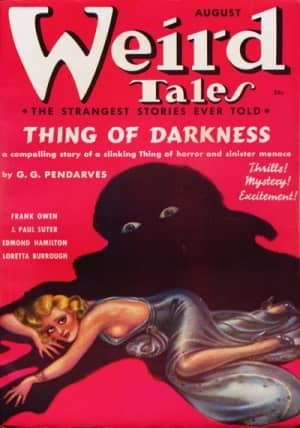Birthday Reviews: Manly Wade Wellman’s “The Terrible Parchment”

Manly Wade Wellman was born on May 21, 1903 and died on April 5, 1986.
In 1956, his story “Dead and Gone” received an Edgar Award for Best Fact Crime Story. Wellman’s collection Worse Things Waiting received a World Fantasy Award for Best Collection in 1975, and in 1976 he received a Phoenix Award at DeepSouthCon. He received a World Fantasy Award Life Achievement Award in 1980 and in 1983 was a Guest of Honor at the World Fantasy Convention in Chicago. At ConStellation, the 1983 Worldcon, Wellman was inducted into the First Fandom Hall of Fame. He received a Special Award from the British Fantasy Society in 1985.
“The Terrible Parchment” first appeared in the August 1937 issue of Weird Tales, edited by Farnsworth Wright. The story was dedicated to the memory of H.P. Lovecraft, who had died five months earlier. In 1972, Meade and Penny Frierson reprinted it in the first issue of their fanzine, HPL. Wellman then included the story in his 1973 collection Worse Things Waiting. In 1996, Robert M. Price selected it for the Chaosium Cthulhu Cycle anthology The Necronomicon: Selected Stories and Essays Concerning the Blasphemous Tome of the Mad Arab. It was also included in the Wildside Press e-book The Second Cthulhu Mythos Megapack in 2016.
While preternatural horror is often the goal of fiction set in Lovecraft’s Cthulhu mythos, humor also has a tendency to sneak in. Wellman’s meta-fictional “The Terrible Parchment” is definitely an early example of humorous Cthuliana, positing a copy of Weird Tales delivered to its subscriber and containing a page from The Necronomicon.
Although the idea of the characters being terrorized by the volume Lovecraft and so many of his followers have described works on a conceptual level, Wellmen’s depiction of the attack undermines the horror and turns the story into a more humorous work. As readers of Weird Tales, the characters are aware of The Necronomicon and its role in Lovecraft’s mythos, and Gwen even suggests that the book has achieved reality based on its legendary nature and fame, already occurring in 1937. The page’s method of attack, moving along the floor like an inchworm and seeping up the narrator’s leg, however, leaves much to be desired as a preternatural horror, as does his means of defense, stabbing at it with his wife’s umbrella.